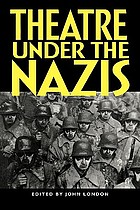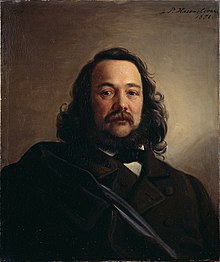In looking at how Germany has appropriated the play Hamlet, as I have discussed before, I decided to look at current productions of Hamlet in Germany.
I found the Shakespeare Festival at the Globe Neuss. (Yes, the Germans have built a replica of the Globe on an old racetrack, and they hold a Shakespeare Festival every summer.) They have done productions of Hamlet in 2003, 2005, 2006, 2007, and 2008 and it's on the schedule for 2011. The program for this summer's festival shows that there are no less than 4 different productions of Hamlet! One by the Globe Touring Company from London (performed in English), and one by the Bremer Shakespeare Company (from Bremen, performed in German), Kupenga Kwa Hamlet, which is a shortened Hamlet done by two Zimbabwen actors (performed in English), and Hamlet (from the East) performed by the Yohangza Theatre Company from Korea (performed in Korean). There is also a lecture/discussion Shakespeare - A German writer, which will discuss Shakespeare's influence on German culture with "bilingual readings from Shakespeare and German poets from Goethe till present day." All of this in four weeks! In addition to Comedy of Errors done in French and English, Twelfth Night, Much Ado About Nothing, Troilus and Cressida all in German, Richard III in English, and Macbeth done by a Swedish choir! Who wants to pay for me to fly to Germany????
Hamlet is very much alive in Germany today. It has had a long, rich history. And, although it was technically written in English by an Englishman, Hamlet is very much German now. There is something about German culture and history that has drawn them to this play, more than any other, so much that they write poems about it, do postmodernist theatrical adaptations of it, and continue to perform it regularly. Lines from the play may have slipped into the vernacular in English speaking countries across the world, but the play itself has wormed its way into the heart of the German people.
I found the Shakespeare Festival at the Globe Neuss. (Yes, the Germans have built a replica of the Globe on an old racetrack, and they hold a Shakespeare Festival every summer.) They have done productions of Hamlet in 2003, 2005, 2006, 2007, and 2008 and it's on the schedule for 2011. The program for this summer's festival shows that there are no less than 4 different productions of Hamlet! One by the Globe Touring Company from London (performed in English), and one by the Bremer Shakespeare Company (from Bremen, performed in German), Kupenga Kwa Hamlet, which is a shortened Hamlet done by two Zimbabwen actors (performed in English), and Hamlet (from the East) performed by the Yohangza Theatre Company from Korea (performed in Korean). There is also a lecture/discussion Shakespeare - A German writer, which will discuss Shakespeare's influence on German culture with "bilingual readings from Shakespeare and German poets from Goethe till present day." All of this in four weeks! In addition to Comedy of Errors done in French and English, Twelfth Night, Much Ado About Nothing, Troilus and Cressida all in German, Richard III in English, and Macbeth done by a Swedish choir! Who wants to pay for me to fly to Germany????
Hamlet is very much alive in Germany today. It has had a long, rich history. And, although it was technically written in English by an Englishman, Hamlet is very much German now. There is something about German culture and history that has drawn them to this play, more than any other, so much that they write poems about it, do postmodernist theatrical adaptations of it, and continue to perform it regularly. Lines from the play may have slipped into the vernacular in English speaking countries across the world, but the play itself has wormed its way into the heart of the German people.





